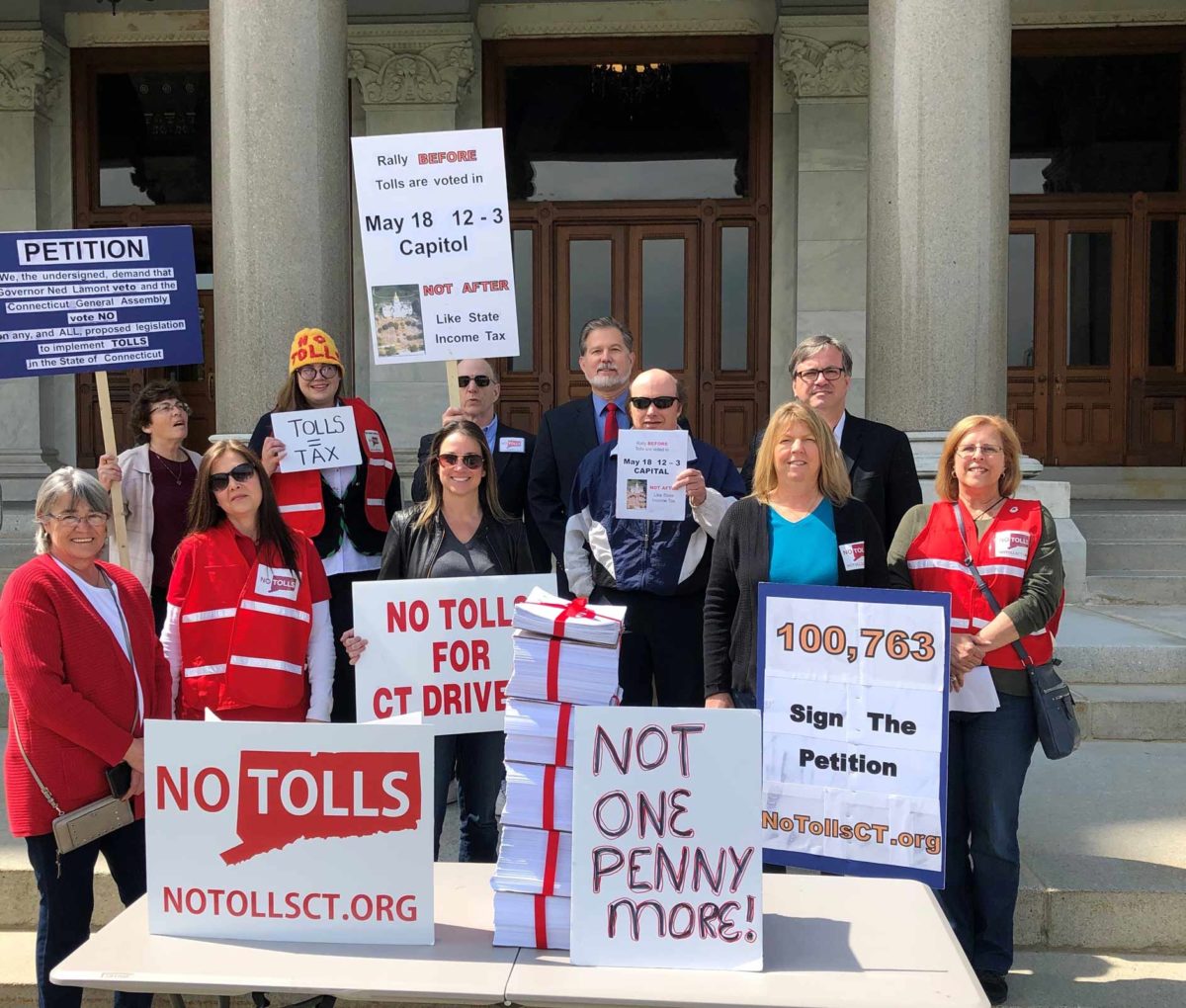Big money vs. grassroots efforts part of fierce toll debate in Connecticut

The fight over bringing tolls back to Connecticut”™s highways is not limited to state Democrats and Republicans ”” it”™s also pitting a deep-pocketed, pro-tolls coalition called Move CT Forward against a grassroots group with the straightforward moniker No Tolls CT.
“Tolls are just another tax burden for residents,” No Tolls founder Patrick Sasser told the Business Journal. “The taxpayers of Connecticut have been very outspoken about this and made their feelings very clear in different polls.”
One such poll, conducted by Sacred Heart University”™s Institute for Public Policy, found 54.5 of respondents saying they”™d alter their driving habits by avoiding toll roads should e-tolling be implemented on major highways in the state. But when asked whether they”™d be more likely to support tolls if it were guaranteed that the money “would only be spent on roads, bridges and highways,” 51 percent said they would either continue to support tolls or be more likely to do so.
Sasser also noted that Connecticut already has the second-highest tax burden of any state. The Stamford firefighter, who also runs an excavating business, said residents have grown tired of hearing how “our bridges are about to collapse, but the money (from the state”™s Special Transportation Fund) never seems to go there. So is there a crisis or is there not?”
On May 9, Sasser presented Gov. Ned Lamont”™s office with a stack of petitions containing over 100,000 signatures from people around the state who are against tolls. Sasser said he spoke “for a few minutes” with Lamont”™s Chief of Staff Ryan Drajewicz ”” as he did in January ”” but received no indication as to what, if any, impact the petitions would have.
Meanwhile, the Connecticut Construction Industries Association (CCIA), the New England Regional Council of Carpenters, the Connecticut Laborers”™ District Council and the Connecticut Ready-Mixed Concrete Association are among the members of Move CT Forward, a coalition formed in late 2017 to address the state of Connecticut”™s Special Transportation Fund, how it is facing bankruptcy, and, more recently, how electronic tolling is a viable solution.
The group”™s belief in the latter is so strong that it is spending $900,000 on a pro-tolls television, radio and digital ad campaign.
CCIA President Don Shubert said the coalition believes that tolling “is the best approach to get a dependable funding stream for the Special Transportation Fund” ”” a point of view shared by Department of Transportation Commissioner Joe Giulietti, who has said the lack of such funding to maintain the state”™s infrastructure “leads to major capital costs and the need to entirely revamp systems, which is not strategically smart as a financial best practice.”
According to the coalition, 57% of Connecticut roads are in poor condition and a third of its bridges are structurally deficient or functionally obsolete. “Tolling means a steady stream of funding for repairs that keep us safe,” according to its website.
Shubert also questioned what the anti-tolls crowd would suggest as an alternative means of addressing the problem. “Everyone agrees that our roads are a problem,” he said. As for those complaining that tolls are “just another tax,” Shubert said: “You”™re going to pay one way or another,” either through tolls or with continued crumbling of roadways, bridges and the like.
Should the tolls bill as written pass, gantries ”” no more than 50 in total ”” would be placed roughly every six to seven miles on I-84, I-95, I-91 and Route 15 (The Merritt Parkway). Drivers who use a Connecticut EZ-Pass and a frequent-user discount could expect to pay roughly 25 to 30 cents per gantry, or 4.4 cents per mile.
Lamont has said that toll revenue, 40% of which would be paid by out-of-state drivers, could total $800 million to $1 billion annually.
Nevertheless, the road ahead for tolls remains uncertain ”” so much so that on May 9 the governor issued a letter to the General Assembly offering a compromise solution to the apparent stalemate.
The letter did not specify how much borrowing Lamont would entertain, but presumably it would be significantly less than what Republicans have proposed under their “Prioritize Progress” plan. That proposal bypasses tolls entirely, calling instead for $684.6 million to $863 million of annual bonding over the next nine years for transportation projects, along with the continuation of Special Tax Obligation bonds for the regular Department of Transportation capital program, and a hard cap of $2 billion on annual general obligation bonds.
The governor said he was not interested in “a compromise in which the numbers don”™t add up, the excessive borrowing crowds out other needed and necessary investments elsewhere and the approach is simply a Band-Aid to buy more time until the point at which we can revisit this conversation in another two years, all while our roads and rail continue to decline and economy limps along. I won”™t kick the can down the road any longer.”
While Republicans are nearly unanimous in their opposition to tolls, there is also less than 100% support among Lamont”™s fellow Democrats, several of whom have complained that the tolls plan does not detail how the resultant revenue would be spent. Senators Alex Bergstein (D-Greenwich) and Will Haskell (D-Westport) support tolls but said they were perturbed by the administration”™s inability to establish a coherent and long-term spending plan.
Senate Republican President Pro Tempore and longtime tolls opponent Len Fasano (R-North Haven) released a statement expressing his disappointment that Lamont “remains unwilling to consider alternatives to fund transportation over the long term that do not involve tolls and new taxes. It is a plan that is based on hypothetical sketch numbers, that has never been shared with the federal government and that takes the full General Assembly out of the decision-making when it comes to how tolls will actually impact our residents and local communities.”